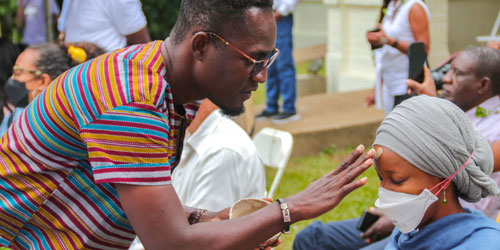As the United States reckons with its history of systemic racism, MacArthur is engaging in an ongoing process of reevaluating our policies and practices to ensure we live up to our Just Imperative. As part of this effort, we have updated our style guide to capitalize Black, Brown, Indigenous, and White when referring to race and ethnicity.
Language conveys values and has been used to uphold racist structures. Throughout U.S. history, many have attempted to systematically erase the ethnic identities of Black communities. Yet, Black culture has endured and flourished and continues to be a unique cultural identity today. We realize it is long past time to recognize it as such in the ways we write.
Blackness with a lowercase ‘b’ is treated as an adjective, a word with no particular weight or meaning. The lower-case ‘b’ is an attempt to be neutral and to imply race is merely a descriptor when it is so much more. Blackness and many other cultural identities are labels bestowed upon us and carried from birth. It is an indicator of personhood, culture, and history. The lower case “b” fails to honor the weight of this identity appropriately.
In this moment of national reckoning, we must reconcile our complicity with a commitment to ensuring a better future that remembers the lessons of the past. It is time to change the way we speak, think, and label Black, Brown, and Indigenous people in our communities—starting with capitalizing these words and recognizing these unique identities. It is also worth acknowledging that terms like people of color and Brown, which are meant to suggest inclusivity and solidarity, have a way of blurring differences between groups. Brown is used to describe a wide range of races and ethnicities—including individuals across southern Asia, northern Africa, and people of Latin American descent. Our practice is to seek and respect self-identification, aiming for specificity. It is a form of orthographic justice that recognizes and reclaims what was stolen from individuals and thereby their descendants.
We will also begin capitalizing White in reference to race. Choosing to not capitalize White while capitalizing other racial and ethnic identifiers would implicitly affirm Whiteness as the standard and norm. Keeping White lowercase ignores the way Whiteness functions in institutions and communities.

“The detachment of ‘White’ as a proper noun allows White people to sit out of conversations about race and removes accountability from White people’s and White institutions’ involvement in racism,” according to the Center for the Study of Social Policy. “We intentionally capitalize ‘White' in part to invite people, and ourselves, to think deeply about the ways Whiteness survives—and is supported—both explicitly and implicitly.”
As author, academic, and cultural critic Eve Ewing argues: “When we ignore the specificity and significance of Whiteness—the things that it is, the things that it does—we contribute to its seeming neutrality and thereby grant it power to maintain its invisibility.”
Language itself is radical. It can be used to either support or challenge the systemic racism we seek to dismantle. We hope that by consciously choosing to capitalize Black, Brown, Indigenous, and White, we can take a small step towards a more just and inclusive world.














